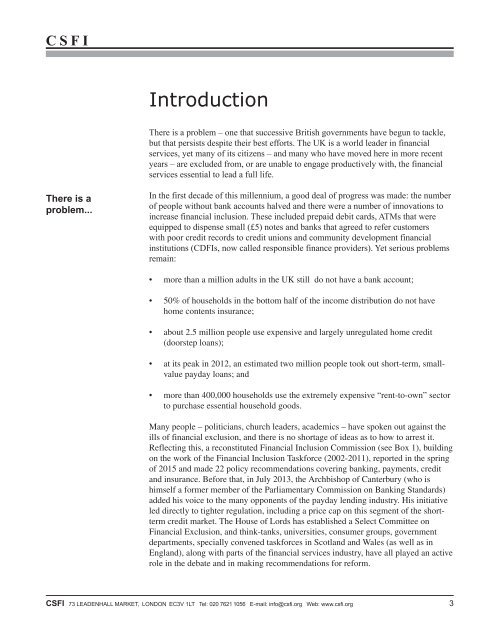CSFI
CSFI+-+Reaching+the+poor+-+release+version
CSFI+-+Reaching+the+poor+-+release+version
You also want an ePaper? Increase the reach of your titles
YUMPU automatically turns print PDFs into web optimized ePapers that Google loves.
<strong>CSFI</strong><br />
Introduction<br />
There is a problem – one that successive British governments have begun to tackle,<br />
but that persists despite their best efforts. The UK is a world leader in financial<br />
services, yet many of its citizens – and many who have moved here in more recent<br />
years – are excluded from, or are unable to engage productively with, the financial<br />
services essential to lead a full life.<br />
There is a<br />
problem...<br />
In the first decade of this millennium, a good deal of progress was made: the number<br />
of people without bank accounts halved and there were a number of innovations to<br />
increase financial inclusion. These included prepaid debit cards, ATMs that were<br />
equipped to dispense small (£5) notes and banks that agreed to refer customers<br />
with poor credit records to credit unions and community development financial<br />
institutions (CDFIs, now called responsible finance providers). Yet serious problems<br />
remain:<br />
• more than a million adults in the UK still do not have a bank account;<br />
• 50% of households in the bottom half of the income distribution do not have<br />
home contents insurance;<br />
• about 2.5 million people use expensive and largely unregulated home credit<br />
(doorstep loans);<br />
• at its peak in 2012, an estimated two million people took out short-term, smallvalue<br />
payday loans; and<br />
• more than 400,000 households use the extremely expensive “rent-to-own” sector<br />
to purchase essential household goods.<br />
Many people – politicians, church leaders, academics – have spoken out against the<br />
ills of financial exclusion, and there is no shortage of ideas as to how to arrest it.<br />
Reflecting this, a reconstituted Financial Inclusion Commission (see Box 1), building<br />
on the work of the Financial Inclusion Taskforce (2002-2011), reported in the spring<br />
of 2015 and made 22 policy recommendations covering banking, payments, credit<br />
and insurance. Before that, in July 2013, the Archbishop of Canterbury (who is<br />
himself a former member of the Parliamentary Commission on Banking Standards)<br />
added his voice to the many opponents of the payday lending industry. His initiative<br />
led directly to tighter regulation, including a price cap on this segment of the shortterm<br />
credit market. The House of Lords has established a Select Committee on<br />
Financial Exclusion, and think-tanks, universities, consumer groups, government<br />
departments, specially convened taskforces in Scotland and Wales (as well as in<br />
England), along with parts of the financial services industry, have all played an active<br />
role in the debate and in making recommendations for reform.<br />
<strong>CSFI</strong> 73 LEADENHALL MARKET, LONDON EC3V 1LT Tel: 020 7621 1056 E-mail: info@csfi.org Web: www.csfi.org 3


